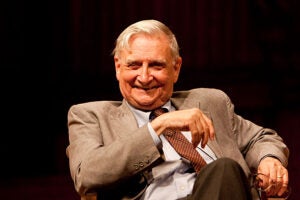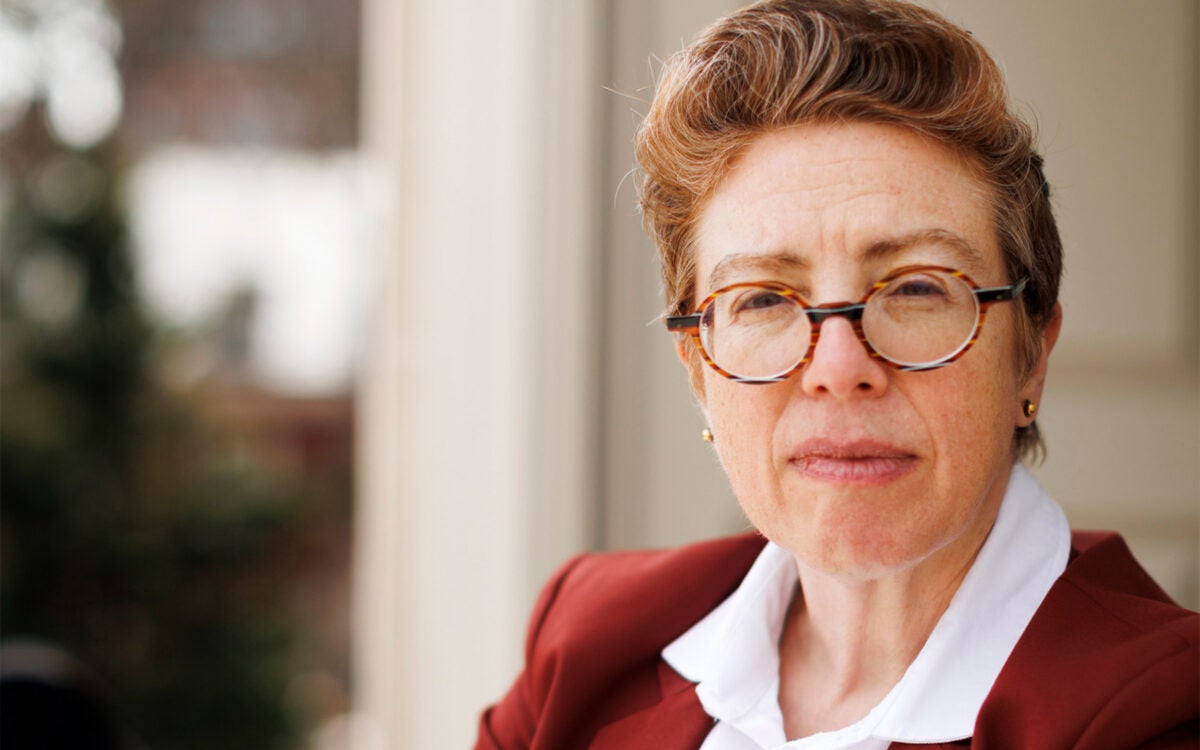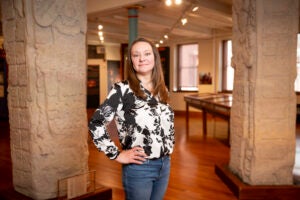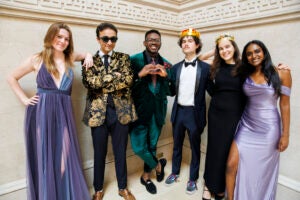Tag: Science
-
Health
Bacteria have more to say than previously thought
Bacteria are the oldest living organisms, dating back 4 billion years. So it is only logical that they have evolved ways to communicate.
-
Health
Vitamin B, folic acid may reduce risk of age-related vision loss
New research from Brigham and Women’s Hospital finds that taking a combination of vitamins B6 and B12 and folic acid appears to decrease the risk of age-related macular degeneration (AMD) in women. This research is published in the Feb. 23 issue of Archives of Internal Medicine.
-
Health
Low-income diabetic women at increased risk for postpartum depression
Researchers at Harvard Medical School (HMS) and the University of Minnesota have found that living just above the poverty line and having diabetes increases by 50 percent a woman’s chance of developing postpartum depression — a serious illness that affects about one in 10 new mothers.
-
Health
Calorie reduction key to weight loss, not food type
Many popular diets emphasize either carbohydrate, protein, or fat as the best way to lose weight. However, there have been few studies lasting more than a year that evaluate the effect on weight loss of diets with different compositions of those nutrients.
-
Campus & Community
Allston update letter
Dear Colleagues, Friends and Neighbors: I am writing today to update you on our plans for development in Allston.
-
Health
Attendance grows at Dental School’s ‘free care day’
Despite historic increases in health insurance coverage in Massachusetts, fewer than 20 percent of the commonwealth’s dentists accept patients insured through public programs such as Medicaid. Although state-subsidized insurance programs include dental care, the insurance mandate does not require employers to cover dental care. Dental schools are considered affordable sites for treatment, but even reduced…
-
Health
Science programs advancing
Harvard President Drew Faust today renewed the University’s commitment to the vision of advancing interdisciplinary, collaborative science in general, and the Department of Stem Cell and Regenerative Biology (SCRB), the Harvard Stem Cell Institute (HSCI), and the Wyss Institute for Biologically Inspired Engineering (WIBIE) in particular.
-
Campus & Community
Red Book applications being accepted by Medical School
Harvard Medical School (HMS) invites junior faculty and postdoctoral fellows to apply for fellowships and grants as part of the spring 2009 Red Book Awards.
-
Health
Clinicians override most medication safety alerts
Computer-based systems that allow clinicians to prescribe drugs electronically are designed to automatically warn of potential medication errors, but a new study reveals clinicians often override the alerts and rely instead on their own judgment.
-
Health
Kou is shaking up the world of statistics
Harvard statistics professor Samuel Kou, now 34, grew up in Lanzhou, a city in China’s mountainous northwest near the border with Inner Mongolia. The altitude there is higher than Denver’s storied mile, and earthquakes rumble through town several times a year.
-
Health
Exploring abundance under the sea floor
Called the North Pond Basin, the site — researchers at Harvard and beyond believe — can provide a window onto a vast world of subterranean microscopic life that extends kilometers below the Earth’s surface and which, according to rough estimates, could rival life above the surface in both diversity and sheer mass.
-
Health
Neural wiring hints at nervous system gene limits
Genetics may play a surprisingly small role in determining the precise wiring of the mammalian nervous system, according to painstaking mapping of every neuron projecting to a small muscle mice use to move their ears. These first-ever mammalian “connectomes,” or complete neural circuit diagrams, reveal that neural wiring can vary widely even in paired tissues…
-
Campus & Community
AAAS honors seven Harvard faculty with title of ‘fellow’
The American Association for the Advancement of Science (AAAS) — the world’s largest general scientific society and publisher of the journal Science — has awarded seven Harvard professors the distinction of AAAS fellow.
-
Science & Tech
Milky Way bigger than thought
Our own Milky Way galaxy, long considered a “little sister” to the larger Andromeda Galaxy, is all grown-up, according to new research. The findings, presented at a Jan. 5 meeting of the American Astronomical Society in Long Beach, Calif., by Harvard-Smithsonian Center for Astrophysics (CfA) researchers, show that the galaxy has about 50 percent more…
-
Science & Tech
Harvard turns wind into power
Watch your footing on those slippery winter sidewalks in Cambridge. But if you’re at the corner of Dunster and Mt. Auburn streets, take a minute to look up.
-
Science & Tech
Exotic force seen for first time
For the first time, researchers have measured a long-theorized force that operates at distances so tiny they’re measured in billionths of a meter, which may have important applications in nanotechnology as scientists and engineers seek new ways to create devices too small for the eye to see.
-
Science & Tech
Mining exec: Coal vital to energy mix
The leader of one of the nation’s largest coal mining companies said Tuesday (Feb. 3) that coal is a vital part of the nation’s energy mix and that clean coal technology must be developed if the atmosphere is to stop warming.
-
Campus & Community
Julio Frenk sees HSPH as ‘first’ in 21st century
In his first address as dean of the Harvard School of Public Health (HSPH), Julio Frenk described what he called his ambition for the School: to become the “first school of public health of the 21st century.”
-
Health
Art and science: Healing in harmony
What do Julie Andrews and Mozart have in common? And what links Hillary Clinton, Che Guevara, and Cameron Diaz? The former have absolute or perfect pitch; the latter are tone-deaf. How our brains differ to create these disparities was one of the subjects of “Crossing the Corpus Callosum,” a first-of-its-kind symposium held Jan. 10 at…
-
Arts & Culture
Isolating creativity in the brain
How — exactly — does improvisation happen? What’s involved when a musician sits down at the piano and plays flurries of notes in a free fall, without a score, without knowing much about what will happen moment to moment? Is it possible to find the sources of a creative process?
-
Science & Tech
Global temp analysis clarifies warming details
An analysis of global temperatures between 1850 and 2007 has illuminated some climate change details, showing that winter temperatures have risen more rapidly than summer temperatures and that the seasons are coming nearly two days earlier than they were 50 years ago.
-
Health
Wilson receives NCSE’s Lifetime Achievement Award
Harvard professor Edward O. Wilson is the recipient of a Lifetime Achievement Award from the National Council for Science and the Environment (NCSE).

-
Health
Two reasons to fete Darwin
Small is beautiful. Small may also be powerful. Judging from a copy on display at Harvard’s Houghton Library, the book that changed the world is only 8 inches high and 5 1/2 inches wide.
-
Health
Gene therapy demonstrates benefit in patients with rheumatoid arthritis
Researchers have reported the first clinical evidence that gene therapy reduces symptoms in patients with rheumatoid arthritis (RA), an important milestone for this promising treatment . Described in the February issue of the journal Human Gene Therapy, the findings stem from a study of two patients with severe rheumatoid arthritis conducted in Germany and led…
-
Health
Blavatnik Family Foundation gives Harvard $10M
The Blavatnik Family Foundation, headed by Len Blavatnik, M.B.A. ’89, has given Harvard University two gifts totaling $10 million in support of its scientific and technological research. Half the gift will go to the Eli and Edythe L. Broad Institute of Harvard and MIT to support cancer vaccine research, and half will go to the…
-
Health
Neural mapping paints a haphazard picture of odor receptors
Despite the striking aromatic differences between coffee, peppermint, and pine, a new mapping of the nose’s neural circuitry suggests a haphazard patchwork where the receptors for such disparate scents are as likely as not to be neighbors.
-
Health
$100 million gift to launch innovative search for AIDS vaccine
Medical School Professor Bruce Walker has been selected as the founding director of a unique new $100 million effort to finally develop a vaccine that can halt the global HIV/AIDS pandemic that, if it continues unchecked, is predicted to claim an additional 70 million lives by 2020.
-
Science & Tech
Riding — and reading — the Earth tide
Once a day, Miaki Ishii rides the Earth tide, rising slowly — along with her desk, chair, and entire office — 20 to 30 centimeters before sinking back again.


